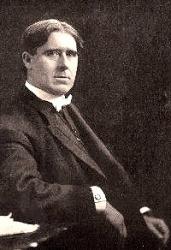1830 - 1918 Person Name: Dr. William S. Pitts Hymnal Number: 80 Composer of "[There's a call from the heart of the Saviour]" in From the Cross to the Crown William Savage Pitts MD USA 1830-1918. Born at Yates, NY, the son of Puritans, he was the 8th of nine children. He had musical ability from an early age, taking formal music lessons from a graduate of the Boston Handel & Hadyn Society. At age 19, he traveled with his family to Rock County, WI, where he worked as a rural music schoolteacher in Union, WI. He taught for several years, there and at singing schools, and for brass bands, composing much of their music. In 1857 he traveled to Fredericksburg, IA, to visit his fiancee, Ann Eliza Warren, a teacher. Along the way he stopped his horse-drawn wagon at Bradford, IA, to rest. He walked across a field and saw a picturesque wooded valley formed by the Cedar River. Viewing the spot, he envisioned a church building there. He couldn’’t get the image out of his mind. Returning home to WI, he wrote out the words to a poem about the envisioned scene, calling it “Church in the wildwood”, for his own sake. He was then at rest about it. In 1862, he was married in Union, WI, and he and his wife moved to Fredericksburg to be near her elderly parents. Upon returning to Iowa, Pitts stopped along the route at the same location he had five years before to see it again. He was surprised to see a little church being built, and being painted brown. He met with the builders and asked why it was being painted brown, finding out that it was the cheapest paint they could find.. money being tight. The church builders, learning about his poem written several years earlier, asked him to bring his church choir to the dedication and sing a dedicatory song. In 1863 he did so. This was the first time the song was sung in public. The Pitts remained at Fredersicksburg, IA, for 44 years and had five children: Nellie, Grace, Alice, William, and Kate. Pitts served as mayor of Fredericksburg for seven years, as school treasurer for 26 years, wrote a biographical local history, and was a Master Freemason. In 1865 Pitts moved to Chicago to enroll at Rush Medical College. While there, to pay expenses, he offered several songs he had written to a music publisher, who chose his song “Little brown church in the vale”, and he sold the rights to his song for $25. He completed medical school, graduating in 1868, but the song was largely forgotten for several decades. Pitts practiced medicine in Fredericksburg until 1906. His wife died in 1886, and he remarried to Martha Amelia Pierce Grannis in 1887. They moved to Clarion, IA, in 1906. She died in 1909. Pitts then moved to Brooklyn, NY, to be with his son, William, who was working for the U. S. War Department. Pitts joined Fredericksburg’s Baptist Church in 1871, then the Congregational Church in Clarion, IA, in 1906, and later the Dyker Heights Congregational Church in Brooklyn, NY, in 1909. He occasionally performed his most famous song. He died at Brooklyn, NY, but was buried in Fredericksburg, IA.
John Perry
W. S. Pitts





